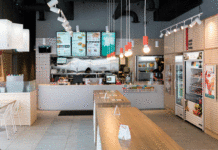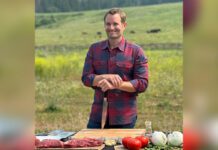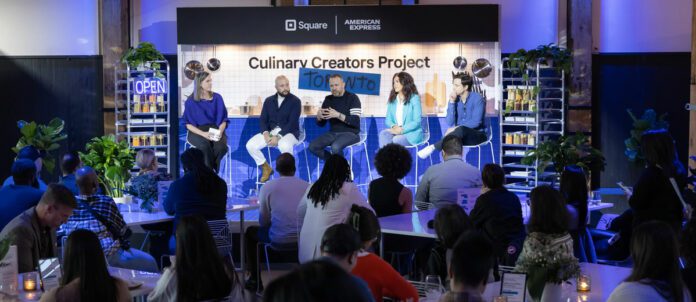TORONTO — Square and American Express recently hosted the Culinary Creators Project at Steam Whistle Brewery in Toronto. The event, which brought together more than 300 attendees, featured a panel of local celebrity chefs/owners to discuss how restaurants can uncover opportunities for growth while keeping their day-to-day operations running smoothly.
Moderated by Karisa Marra, head of Sales, Square Canada, the panel featured Patrick Kriss, chef and founder, Alo Food Group; Craig Harding, founder and culinary director, Bar Prima, La Palma and Constantine, and co-host of Cooking Italy; Nicki Laborie, founder and owner, Reyna Hospitality Group; and Derek Wasser, Chief Operating Officer, The Food Dudes.
The panel kicked off with a discussion about how the panellists have been impacted by several industry challenges, including labour shortages, inflation and tight margins, and how they’ve turned those challenges into opportunities.
“We don’t like to take away our customers,” said Kriss. “We look internally to make changes that can make us more efficient, cut costs, et cetera. A customer who’s in your restaurant on Saturday should have the same experience on a snowy Monday. We haven’t changed too much at the front-of-house, it’s the back end of things that we’re concerned about.”
“We cut some of our service periods back (breakfast and lunch) at both [Bar Prima] and La Palma to focus on the most popular service period, which is dinner,” said Harding. “We also started doing a lot more events. We hired an events team a few years ago, and it’s now grown to three people. We captured a lot of these things organically, but we’re also trying to find new sources of revenue.”
From there, Marra asked the panellists to share their biggest struggle to date without referring to the COVID-19 pandemic or the current state of the economy.
“My biggest challenge was scaling,” said Harding. “Opening one restaurant is challenging enough, but you lose a little control when you decide to open two, three, four restaurants or other vertical businesses. You hire a team to manage those individual businesses and you need to empower them. Being able to trust and feel good about not being there for every decision was a challenge.”
“This is an obvious question for a female in the hospitality industry,” said Laborie. “Being female is one of the biggest challenges and also working with females because we’re just a dime a dozen. There aren’t many females in this industry and that’s been a challenge for me in the business side of things because sometimes I’m not taken seriously by construction, landlords or chefs, but I look forward to that changing.”
Additional challenges were recognizing the intensity of the job with regard to number of events a week, hours and scheduling, and maintaining a work-life balance.
“You’re working constantly, so seven days can become 10, and 10 can become 30 in a row,” said Wasser. “Finding that balance is a common struggle I think all of us will have until we’re hanging them up, but it’s something to work towards.”
Next, the panellists talked about how their restaurants have embraced automation and the results from it. Collectively, they agreed automation allowed them to get things done quicker and feel more aware of what’s going in their operations.
“Our POS system is working with our reservation platform to communicate,” said Harding. “If I’m not around, I can see what a guest is ordering in a particular moment, how long it has been between courses, et cetera. I have a bird’s eye view of how things are going. All of that information is stored on the cloud, so I can go back and say ‘that guest prefers sparkling water’ or ‘this guest enjoyed a couple Manhattans.’ This information allows us to deliver the best guest experience,” adding that online ordering, invoices and inventory processes have also switched over to the cloud.
The panel wrapped up with a discussion about knowing when to scale and how to approach branding.
“In terms of knowing when to scale, I’ve always used my gut and good opportunities. I’ve always been taught not to miss an opportunity, analyze it thoroughly, and if it works then try to make it happen,” said Laborie.
“There’s no playbook on scaling,” says Harding. “You just have to know in your soul when it’s the right time.”
With regard to branding, The Food Dudes has always had “a huge drive to create content and to create events and parties that had food trucks and branded cars,” said Wasser. “[We’re constantly thinking about how we can improve our concept] when providing food-driven entertainment, which gives us a competitive edge,” adding that pushing business cards and investing in website development are also important considerations for branding.
Conversely, Kriss said his company has a lot to learn on the branding and content creation front. “For the last year, we’ve put a lot of effort into it and are doing the research in order to reach out to new customers. Typically, just like my personality, we don’t like to talk about ourselves too much. I like to hang back and do my own thing.”
Overall, “branding is about telling an authentic story. You need to be honest from the beginning and if it’s not tight and concise then people get confused and might ask themselves, ‘what is this?’ and ‘why am I going here?’ You need to be smart about how your story is crafted.”


















